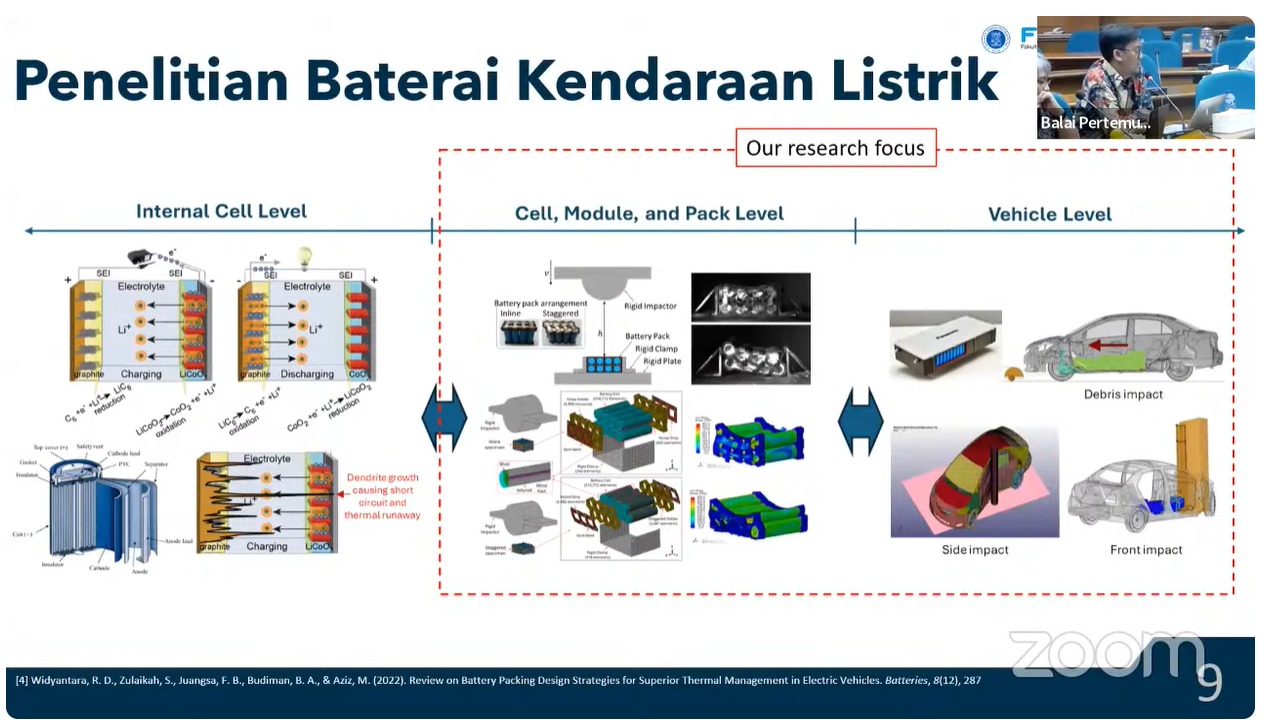The Role of FTMD ITB in the Battery Industry for Electric Vehicles (EVs)
Bandung – The Forum of Professors (FGB ITB) held a Focus Group Discussion (FGD) with the theme “The Role of ITB in the Battery Industry for Electric Vehicles (EV)” in a hybrid format attended by ITB’s academic community. The event featured several speakers, including Adhietya Saputra from Indonesia Battery Corporation, Dr. Bentang Arief Budiman from FTMD ITB, and Achmad Rochliadi from FMIPA ITB.
One of the academic staff from FTMD ITB, Dr. Eng Bentang Arief Budiman, who has conducted extensive research in the field of batteries and electric vehicles, gave a presentation titled “Mastering Battery Technology to Welcome the Electric Vehicle Revolution.” He discussed the urgency of managing the automotive industry holistically in Indonesia, supported by the fact that Indonesia is one of the largest automotive markets in the world. “Even during the Covid-19 pandemic, the number of vehicles in Indonesia continued to increase,” explained Dr. Bentang, emphasizing the potential for growth and development in this industry, given the alignment between this demand and Indonesia’s large population.
However, Indonesia is currently still focused on manufacturing and assembly. Research and development, particularly in design and prototyping, are mainly conducted abroad. Given Indonesia’s broad market target, all production phases should ideally be carried out domestically.
On the other hand, Indonesia has a new opportunity to take advantage of the electric vehicle revolution. This can provide momentum for the national industry to move forward and take on domestic roles previously dominated by foreign automotive industries.
“This revolution is driven by increasingly stringent emission regulations, advancements in battery technology, and decreasing production and maintenance costs of electric vehicles,” he said.
It is also supported by the very high global demand for batteries. By 2035, global battery demand is projected to reach 5,300 GWh, dominated by demand from four-wheeled electric vehicles, followed by two-wheeled electric vehicles, buses, battery energy storage systems, and electric goods, with the largest demand coming from the United States, the European Union, and Asia. Indonesia, with the largest nickel reserves in the world as a key component of lithium batteries, has a great opportunity to become a global supplier of battery raw materials and batteries.
Dr. Bentang discussed several research projects conducted at ITB related to electric vehicle batteries. This research includes the development of high-protection batteries, focusing on reducing the risk of thermal runaway and impact damage. Dr. Bentang’s team developed a homogenization method to enhance battery strength and stiffness and tested the impact resistance of cylindrical batteries. Additionally, battery cooling system development is a major focus, with water and liquid cooling systems designed to keep battery temperatures optimal and minimize performance degradation.
Electric vehicle integration technology is also a research focus at ITB, with the development of various components such as electric motors, inverters, and control systems, targeting a Domestic Component Level (TKDN) of 90%. Regarding safety, ITB conducts research and simulations on crashworthiness design to ensure the safety of electric vehicle batteries during accidents, focusing on battery protection from impact and prevention of short circuits.
Furthermore, ITB is also researching future batteries, specifically Solid State Batteries (SSB), which are known to be safer and have higher energy efficiency. In this research, the ITB team is exploring Functional Gradient Materials (FGM) technology to improve the mechanical durability of SSBs and minimize the risk of cracking. He also discussed the potential of solid-state batteries to dominate the market, necessitating greater expertise in the future.
With various research and development efforts, this demonstrates FTMD ITB’s commitment to developing safer, more efficient, and highly competitive electric vehicle battery technology. FTMD ITB also highlights its significant role in the battery industry for electric vehicles, helping Indonesia harness its vast potential to face the global electric vehicle revolution.







